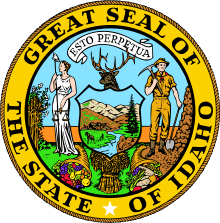Thomas M. Bowen
| Thomas M. Bowen | |
|---|---|
 | |
| United States Senator from Colorado | |
|
In office March 4, 1883 – March 4, 1889 | |
| Preceded by | Horace Austin Warner Tabor |
| Succeeded by | Edward Oliver Wolcott |
| 4th Governor of Idaho Territory | |
|
In office 1871 – 1871 (one week) | |
| Preceded by | David W. Ballard |
| Succeeded by | Thomas W. Bennett |
| Personal details | |
| Born |
October 26, 1835 Burlington, Michigan Territory (now Iowa) |
| Died |
December 30, 1906 (aged 71) Pueblo, Colorado |
| Political party | Republican |
| Profession | Attorney |
| Military service | |
| Service/branch |
United States Army Union Army |
| Years of service | 1861–1865 |
| Rank |
|
| Battles/wars | American Civil War |
Thomas Mead Bowen (October 26, 1835 – December 30, 1906) was a United States Senator from Colorado.
Biography
Bowen was born near the present site of Burlington, Iowa, in what was then Michigan Territory. He attended the public schools and the academy at Mount Pleasant, Iowa. He studied law and was admitted to the bar in 1853 and began practicing law. He was married to Margaretta T. Bowen.[1]
Career
Bowen moved to Wayne County, Iowa, in 1856 and was a member of the Iowa House of Representatives that year. In 1858, he moved to Kansas. During the Civil War served in the Union Army from 1861–1865, as captain, then as a colonel. He was brevetted a brigadier general.
After the war, Bowen found himself in Arkansas and decided to stay there. He was a member and president of the constitutional convention of Arkansas in 1866;[2] he was also a Reconstruction era justice of the Arkansas Supreme Court from 1867 to 1871.[3]
Bowen, who made a large fortune in business, was appointed governor of Idaho Territory by U.S. President Ulysses S. Grant in 1871, but resigned and returned to Arkansas after only one week in office. He moved to Colorado Territory in 1875 and resumed the practice of law.
Upon Colorado's statehood a year later, Bowen was elected judge of the Fourth Judicial District Court, a position which he held from 1876 until 1880, when he suddenly resigned. He had given a lenient sentence to John J. Hoover, a murderer in Fairplay in Park County, who was thereafter lynched by an irate mob on April 28, 1880, while awaiting transfer to the Colorado State Penitentiary.[4]
Bowen was a member of the Colorado House of Representatives in 1882 and resigned soon thereafter upon his election as a Republican to the United States Senate. He served in that body from March 4, 1883, to March 4, 1889.[5] While in the Senate, he was chairman of the Committee on Mining (in the Forty-eighth Congress), Committee on Enrolled Bills (Forty-ninth and Fiftieth Congresses).
Death
Bowen engaged in mining in Colorado and resided in Pueblo, where he died.[6] He is interred at Roselawn Cemetery in Pueblo.[7]
See also
References
- ↑ "Thomas M. Bowen" (PDF). American National Biography. Retrieved 14 September 2012.
- ↑ "Thomas M. Bowen". The Political Graveyard. Retrieved 14 September 2012.
- ↑ "Thomas M. Bowen". Biographical Directory of the United States Congress. Retrieved 14 September 2012.
- ↑ Laura King Van Dusen, "Crime and Punishment in 1880s Fairplay: People Protest Light Sentencing, Deliver Frontier Justice", Historic Tales from Park County: Parked in the Past (Charleston, South Carolina: The History Press, 2013), ISBN 978-1-62619-161-7, pp. 89-96.
- ↑ "Thomas M. Bowen". Find A Grave. Retrieved 14 September 2012.
- ↑ "Thomas M. Bowen". Biographical Directory of the United States Congress. Retrieved 14 September 2012.
- ↑ "Thomas M. Bowen". Find A Grave. Retrieved 14 September 2012.
External links
| Wikimedia Commons has media related to Thomas M. Bowen. |
- United States Congress. "Thomas M. Bowen (id: B000686)". Biographical Directory of the United States Congress. Retrieved 2008-10-19
- "Thomas M. Bowen". Find a Grave. Retrieved November 3, 2008.
- The Political Graveyard
| United States Senate | ||
|---|---|---|
| Preceded by Horace A. W. Tabor |
U.S. Senator (Class 2) from Colorado 1883–1889 Served alongside: Nathaniel P. Hill, Henry M. Teller |
Succeeded by Edward O. Wolcott |

